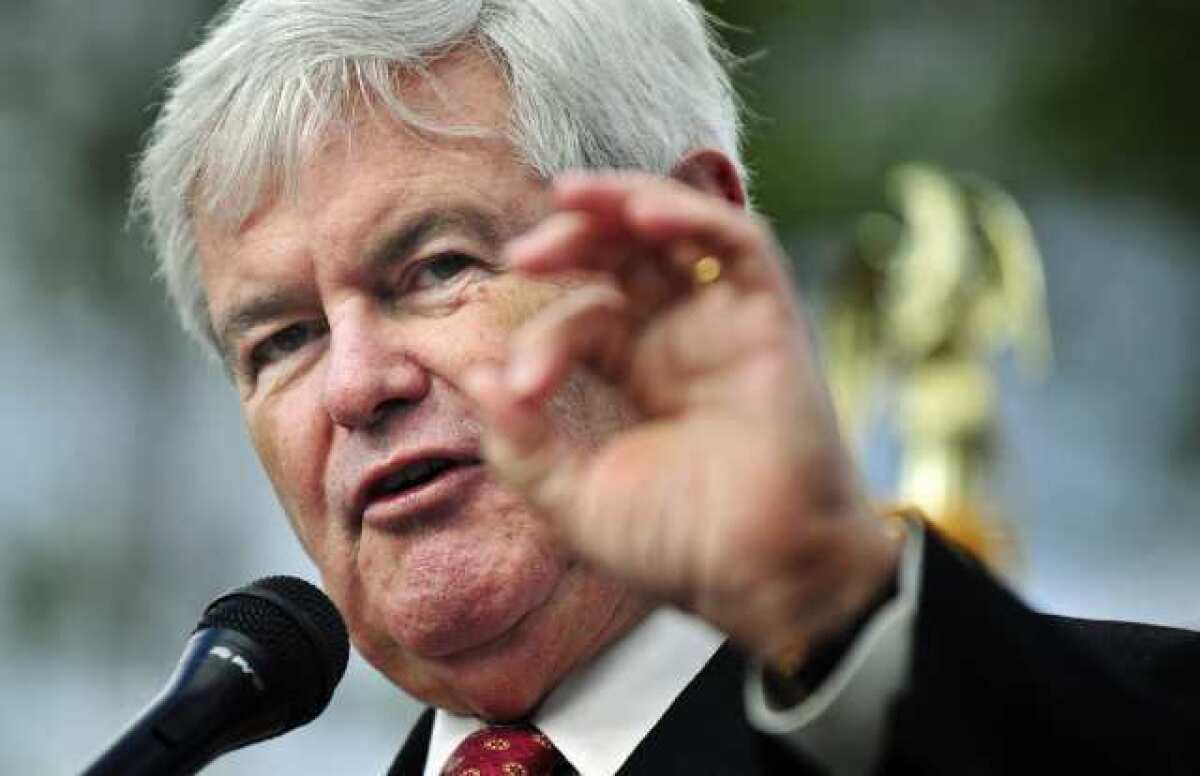McManus: A Gingrich presidency?

A couple of weeks ago, I wrote that if Mitt Romney won the South Carolina primary, the Republican presidential race would be over and he would be the nominee. But Romney didn’t win, and that means it’s time to consider the unthinkable: What would life under President Gingrich be like?
It’s an easy question to answer because Gingrich has spent much of his campaign listing all the things he wants to do — not only in his first term or his first 100 days but in his first eight hours.
A Gingrich presidency would be just like its chief: noisy, combative and prone to self-generated crises.
But don’t take my word for it. Let’s allow President Gingrich to describe his first day in the White House in his own words.
“Our goal would be, by the time President Obama lands in Chicago, to have dismantled about 40% of his government,” Gingrich said recently.
“You will see, I think, between 100 and 200 executive orders signed on the very first day,” he said. “You will see us move the federal government, in the first six or eight hours of the Gingrich presidency, further than it’s ever been moved in modern times.”
Gingrich hasn’t settled on all the executive orders he wants. He’s asked supporters to email him with suggestions. (You still have time to get your favorite executive order on the list.) But he has mentioned a dozen of his top priorities for immediate White House action during campaign appearances.
President Gingrich would act on Day 1 to abolish all the policy “czar” positions in the White House that conservatives have objected to as centralizing too much power in the president. He would sign another order halting implementation of the healthcare law that Obama got through Congress in 2010. He would instruct his new attorney general to abandon the Obama administration’s lawsuits against Arizona and South Carolina over their decisions to enforce federal immigration laws more toughly than the federal government. He would order the State Department to approve construction of the Keystone XL oil pipeline from Canada to Texas, even though environmental reviews haven’t been completed. He would open more offshore areas for oil and gas drilling. He would instruct military tribunals to ignore the Supreme Court ruling that gave detainees at Guantanamo the right to challenge their imprisonment in U.S. courts. And he would move the U.S. Embassy in Israel from Tel Aviv to Jerusalem.
And that’s just on Day 1.
Could he really do all that? Many of Gingrich’s proposed executive orders fall within a president’s traditional decision-making power. But at least two would touch off crises — one constitutional, the other diplomatic.
His proposal to order the U.S. military to ignore the Supreme Court would virtually guarantee a showdown between two branches of government.
The decision Gingrich rejects is Boumediene vs. Bush, a 2008 ruling that allowed prisoners at Guantanamo to challenge their detentions in court.
“On the opening day, first day I’m sworn in, I will issue an executive order to the national security apparatus that it will not enforce Boumediene and it will regard it as null and void because it is an absurd extension of the Supreme Court into the commander in chief’s [authority],” Gingrich said in South Carolina last month.
“If the court makes a fundamentally wrong decision, the president can in fact ignore it,” he said.
He gets points, at least, for originality. Even Richard M. Nixoncomplied with Supreme Court orders when they went against him. A former attorney general under President George W. Bush, Michael B. Mukasey, told the New York Times that Gingrich’s solution to the Boumediene decision was like “[getting] rid of termites by burning your house down.”
“It would lead us to become a banana republic,” Mukasey said.
Gingrich’s second crisis on inauguration day would be diplomatic. There’s a reason no president from either party has moved the U.S. Embassy in Israel to Jerusalem, despite Congress voting to do so. It would throw American diplomacy in the Middle East into chaos. Moving the embassy would change a long-held policy that Jerusalem’s formal status should be determined in peace negotiations between Israel and the Palestinians. The Palestinians aren’t likely to feel warm toward Gingrich anyway, since he dismissed them last month as “an invented people.” But more important, Saudi Arabia, Jordan and the Persian Gulf states — important allies in the confrontation with Iran — would feel compelled to put their relationships with Washington into a deep freeze.
Would President Gingrich actually take those two crisis-inducing steps? If he were an ordinary politician, the answer almost surely would be no. But Gingrich, as he often says, wants to “fundamentally transform” the way government works. As speaker of the House, he never shied from creating a bit of chaos in the service of his larger agenda.
A President Gingrich couldn’t rewrite the nation’s healthcare law or tax law on his own; he would need Congress for those. Nor could he universally abolish child labor laws or, sadly, build lunar colonies. But he can issue executive orders, and he can do it on Day 1.
With most presidential candidates, voters worry that campaign promises are empty words that will never be carried out. But in the case of Newt Gingrich, the worry will be that he means exactly what he says.
More to Read
Start your day right
Sign up for Essential California for news, features and recommendations from the L.A. Times and beyond in your inbox six days a week.
You may occasionally receive promotional content from the Los Angeles Times.







